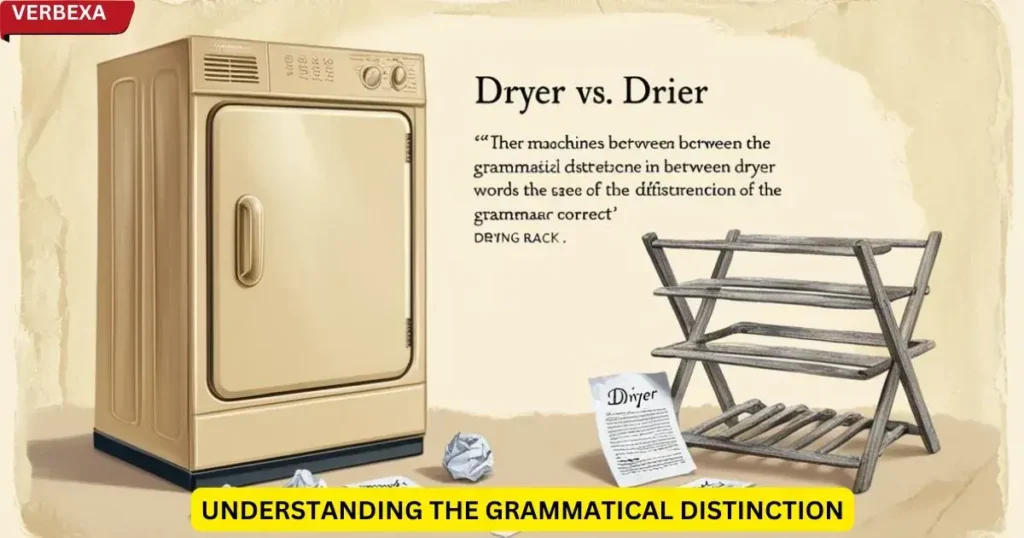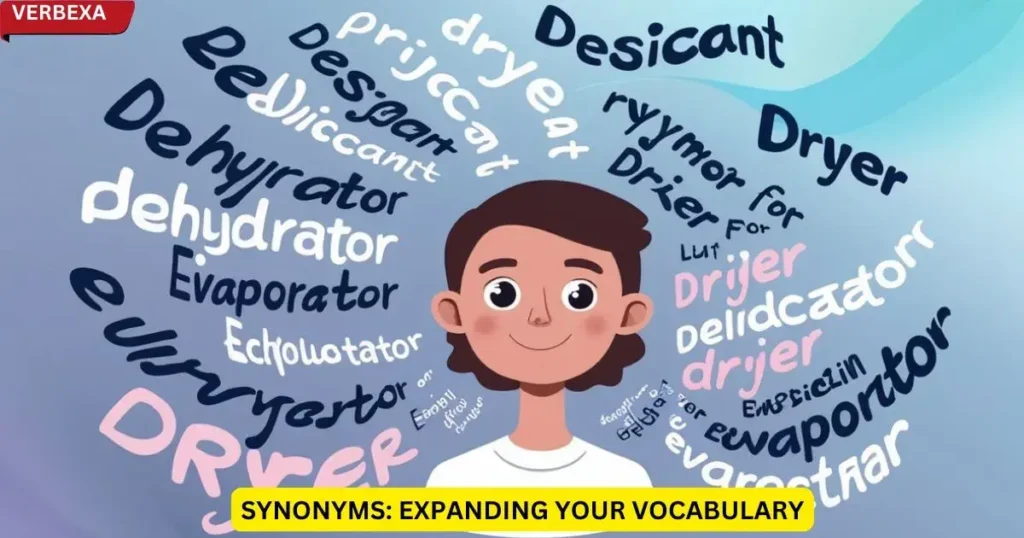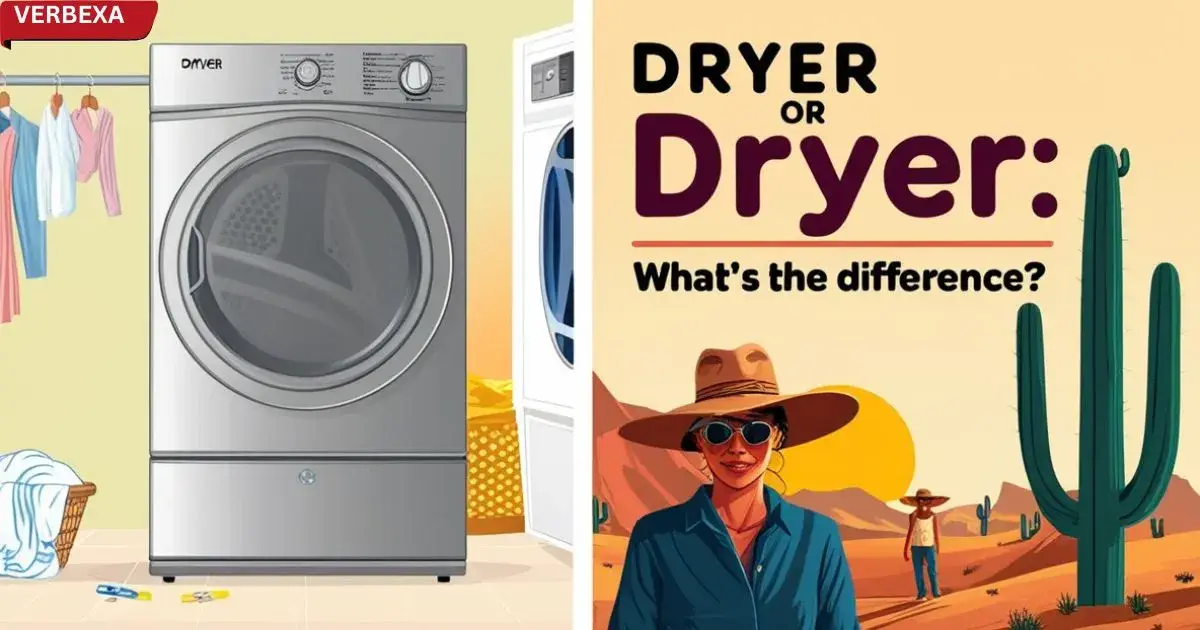Ever found yourself scratching your head, wondering whether to write “drier or dryer“? You’re not alone. These two terms have been causing linguistic headaches for writers, speakers, and language enthusiasts alike. Dryer or drier might sound like twin siblings, but they’re actually quite different beasts in the world of language.
Imagine you’re telling a friend about the laundry room, and you slip up between “dryer” and “drier“. Suddenly, your carefully constructed sentence becomes a grammatical minefield. This article will be your ultimate guide to navigating the tricky terrain of dryer or drier, helping you communicate with confidence and precision.
Understanding the Grammatical Distinction

Part of Speech Breakdown
Dryer and drier might sound similar, but they play entirely different roles in language:
- Dryer (noun): A machine for drying, typically used in the laundry room
- Drier (comparative adjective): Describing something with less moisture
Precise Definitions Explored
Dryer Definition
A dryer is a household appliance designed to remove moisture from wet items, particularly clothing. Think of your trusty clothes dryer or hair dryer – these are quintessential examples of drying equipment.
Drier Definition
Drier is the comparative form of “dry”, describing something with less moisture. For instance, a drier climate or drier weather conditions.
Synonyms: Expanding Your Vocabulary

Dryer Synonyms
- Dehydrator
- Moisture remover
- Drying machine
- Extraction device
- Spin dryer
- Clothes processor
- Textile drier
- Humidity eliminator
- Moisture extractor
- Thermal drying unit
Drier Synonyms
- Less moist
- More arid
- Less humid
- More parched
- Less wet
- More dehydrated
- Less saturated
- More moisture-free
- Less damp
- More water-depleted
Comprehensive Comparison Table: Drier vs Dryer
| Aspect | Dryer | Drier |
|---|---|---|
| Part of Speech | Noun | Comparative Adjective |
| Primary Usage | Appliance for drying | Describing moisture levels |
| Common Contexts | Laundry, hair care | Weather, climate, physical conditions |
| Example Sentence | “I’m putting clothes in the dryer.” | “The desert is drier than the rainforest.” |
When to Use Each Term: Actionable Guidance
Dryer Usage
Use dryer when referring to a specific machine for drying:
- Hair dryer for styling
- Clothes dryer in the laundry room
- Tumble dryer for garments
Drier Usage
Employ drier when comparing moisture levels:
- Drier climate in desert regions
- Drier conditions during summer months
- Drier than previous state or alternative location
Everyday Usage Examples: Putting It into Practice
Dryer in Action
- “I need to buy a new dryer for my apartment.”
- “The hair dryer helps style my locks quickly.”
- “Our washer and dryer set makes laundry day easier.”
Drier in Context
- “The drier regions of the world experience less rainfall.”
- “This summer feels drier than last year.”
- “Mountains tend to have drier air compared to coastal areas.”
Contextual Nuances: Dryer or Drier?
Understanding dryer or drier goes beyond simple definitions. It’s about contextual usage and semantic differences. A drier climate doesn’t imply you’re talking about a dryer machine – context is key!
Common Mistakes to Avoid
- Don’t confuse dryer (noun) with drier (adjective)
- Remember: Dryer is a thing, drier describes a condition
- Context determines the correct term
Pro Tips for Language Clarity
- Always consider the context
- Think about whether you’re describing a machine or a condition
- When in doubt, read your sentence aloud
Mastering the dryer or drier distinction is just one step in your language journey. Keep learning, stay curious, and never stop exploring the fascinating world of words!
FAQs
Is it dryer or drier?
Both terms are correct, but their usage differs. “Dryer” refers to a machine, while “drier” is a comparative adjective describing something with less moisture.
Is it drier or more dry?
“Drier” is the preferred comparative form when describing reduced moisture levels. “More dry” is grammatically correct but less commonly used in standard English.
How do you use drier in a sentence?
You can use “drier” to compare moisture levels, such as “The desert climate is drier than the coastal region.” It describes conditions with less humidity or moisture.
Is it hand dryer or drier?
“Hand dryer” is the correct term when referring to the machine used to dry hands in bathrooms. The appliance is always called a hand dryer, not a hand drier.
Is it a tumble dryer or tumble drier?
“Tumble dryer” is the standard term in most English-speaking countries. While “tumble drier” exists, “tumble dryer” is more widely used and recognized in modern language.
Conclusion: Mastering the Dryer vs Drier Challenge
Dryer or drier might seem complicated, but with practice, you’ll navigate these linguistic waters with ease. Whether you’re talking about your laundry appliance or describing moisture levels, you now have the tools to communicate precisely and confidently.
Remember: A dryer dries things in your laundry room, while something drier simply has less moisture. Simple, right?

This author is a passionate linguist and grammar enthusiast, dedicated to helping individuals master the art of language. With years of experience in teaching and editing, she brings clarity and precision to every sentence. Tina’s mission is to empower writers of all levels to express themselves with confidence and excellence.

